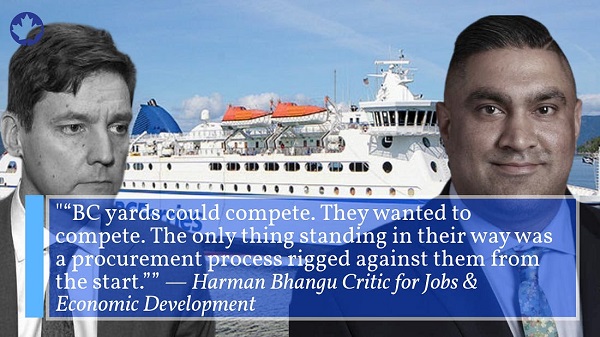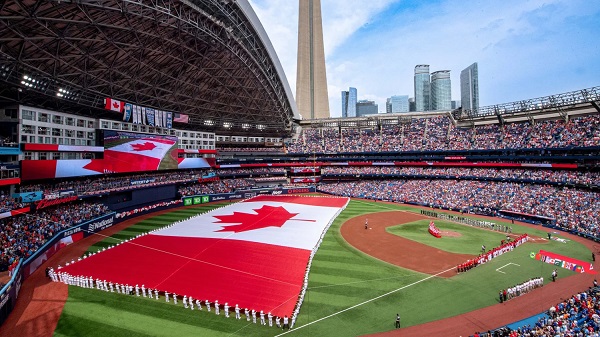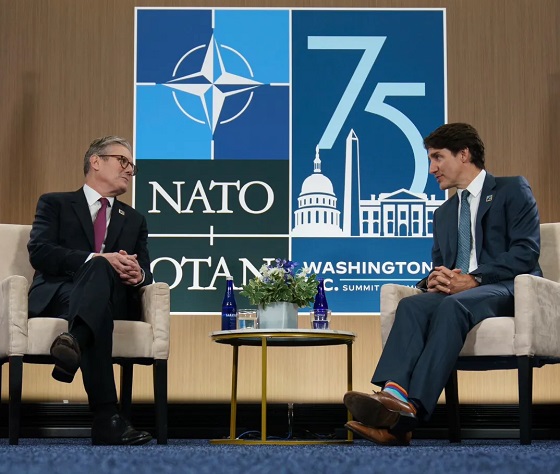Frontier Centre for Public Policy
Trudeau ‘finished what his father started’ driving Canada into failing freefall
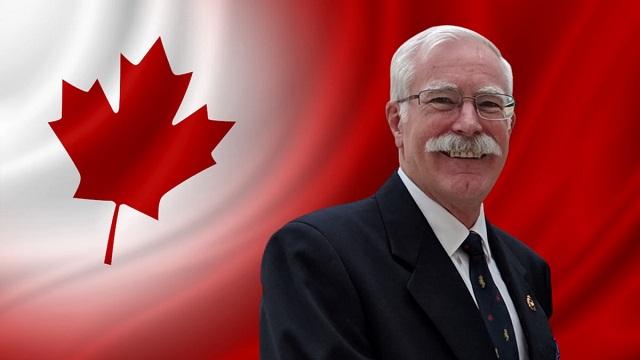
From the Frontier Centre for Public Policy
In 2015 Prime Minister Justin Trudeau scorned Canada — a country that afforded him so much, yet to which he had contributed nothing of notable significance. His disdain for those on whose backs Canada was built was clear. History and European national origins had to be blotted out.
Canada was a “post-national” nation with “no core identity,” he arrogantly told the New York Times. The reckless socialist ideology he spat out was an omen of the division, fear and attack on so-called privileged (white) Canadians that hit like a storm. It hovers over us like a choking toxic cloud.
If Trudeau’s vision was a Canada “completely splintered,” with Quebec a nation unto itself “separate and distinct,” English-speaking provinces “fractured into oblivion” and breaking up our “common culture” — then mission accomplished.
“He’s finished what his father started,” said Lt. Col. Dave Redman (ret’d), who served 27 years with the Canadian Armed Forces and headed Alberta’s Emergency Management Agency.
The Trudeau concept of a post-national state is “dangerous and misleading.”
“It implies that democratically elected national governments are no longer relevant.”
Redman explained Canada’s “shifting socio-political landscape” with powerful clarity in Canada 2024: A Confident Resilient Nation or a Fearful Fracture Country? in the Frontier Centre for Public Policy.
Canadians know something has gone terribly wrong beyond mounting financial struggles and trampled rights. Our nation’s rife with “apologies and internal divisions,” said Redman.
“Confidence has been turned into fear and shame. Canada has become irrelevant on the world stage.”
Canada’s in a “failing” freefall.
“Why will no one invest economically in Canada? Why are people leaving Canada? Why are people not believing that Canada has a future? Why are our allies ignoring us and holding us in disdain? Because we are a threat to their national security because China can get to them through us.”
Canada’s at a “critical juncture.” Until politicians and Canadians unite with common values and defended borders —necessary for a successful nation — Canada will be “stumbling from one crisis to another.”
Until Canadians hold them to account, politicians will fixate on minor “wedge” issues — such as diversity, equity and inclusion (DEI) — to divert attention from critical national concerns they want us to ignore.
Convincing people to feel bad about themselves makes it easier to manipulate guilt and usher in destructive, ideological programs with obscene price tags.
Canada must foster national pride, prioritize national interests and protect national security to secure its future, said Redman.
“A nation is successful when a group of people live in one country with defended borders and share common values, even if they vary in cultures and languages.”
Redman’s six-point framework for national interests includes unity, national security, good governance, protection of rights and freedoms, economic prosperity and growth and personal and community well-being. He offers strategies on how to achieve these critical objectives.
“I believe the current sitting government truly does believe that the World Economic Forum’s concepts and ideals of post-national states is what Canada should be and they have started it.”
“I believe the current government of Canada is intentionally walking each of those six national interests away from Canada in a way that will allow Canada to become part of a broken world.”
It’s up to Canadians to decide what direction we head in.
“The reason I wrote this paper was to make people think about our country in a 20-to-25-year vision. And not let the current government which loves to use divisive, tactical issues to destroy the larger picture conversation. And in doing so, destroy our economy, destroy our unity, destroy our national security by focussing on tactical issues,” said Redman.
A vision for Canada involves citizens who are optimistic about the future, have self-respect to follow through on their ideas, and courage to stand up for their culture and ideals, he said.
Trudeau and his band of self-serving renegades unleashed an ideological curse on Canada.
But we let them.
Then COVID-19 demonstrated how quickly rights and freedoms “can be trampled on, eviscerated and dismissed.”
For a glorious moment in time Freedom Convoy truckers rejuvenated Canadian pride, united Canadians and emboldened us to fight for freedom. Peaceful protesters who waved the Canadian flag were punished.
Yet the silence is deafening as people who despise Canada’s core identity — yes, Trudeau, we have one — hijack our nation and our children’s future.
Redman points to “diaspora marching routinely in the streets of our cities supporting illegal terrorist organizations demanding the death of both citizens here and abroad.”
They wave flags but never the Maple Leaf. They support other countries “but do not march for Canada.”
“Unity is the core value for a country. A cultural unity is based on common shared ethics, values and beliefs. People wishing to become citizens of a country must understand these principles of belief and join the country because they wish for the same to be the foundation of their daily lives.”
“Many who come to a country, not wishing to join the cultural unity of that country, are enemies, intentional or otherwise, who work to erode or destroy this unity.”
Immigration is part of national security.
“You’re pouring people into our country who do not share our ethics and values. And you’re doing it intentionally. That will destroy unity and while it’s destroying unity it will destroy economic prosperity and growth.”
“Our police and courts take no action or in fact support these illegal acts.”
“Our current federal government, many of our provincial territorial governments and our municipal governments stand silently by, or in some cases support the destruction of our values, laws and national interests.”
Redman said the question is, what do Canadians want Canada to be? Will we stand up and root out infectious ideology? Is it too late?
“My paper is about how to overcome what’s happened. It’s happened, we can’t change that. But it’s how to get politicians and Canadians to change how they think about our country. And to have a process to put in place, a vision for our country and have elected officials explain what they see the vision to be. Canadians can make a choice between visions.”
Citizens, academia, public and private sector organizations, unions, religious and non-religious groups need to get involved to break down national interests into “clear and attainable objectives.”
Politicians must explain what unity and democracy means to them. That’s not happening.
Many Canadians are pinning hopes on Conservative Leader Pierre Poilievre forming the next federal government.
“My line to Poilievre is I understand his tactical four bullet plan you know that inflation’s up, the cost of living’s up, that housing’s bad and people need more money in their pocket.”
“I get it. He’s beating that drum over and over. But we’ve got a year before the election, he needs to start talking about his vision for Canada.”
Canada was once internationally respected, trusted and consulted. Now we are pitied by shocked outsiders witnessing woke ideology and crushed free speech forced upon us.
“We’ve been taught to be ashamed of our history instead of proud of it, or even to learn from it.”
“We have completely shattered democratic institutions. Our election system is in question. Our legislatures are in turmoil, our courts, our schools, our medical system. The mainstream media is completely partisan. Our economy is broken. People can’t meet bills at the end of the month and we’re ignored and shunned by our allies.”
Redman addressed good governance, offering guidelines on how to “strengthen and preserve the democratic way of life in Canada.”
“Good governance to me means defence of democracy, where in other countries it can mean absolute control of a totalitarian government.”
Redman’s suggestions to stop Canada from being completely “shattered” include a 100% immigration policy review; halting funding to universities that are “domestic threats” and removing Marxists professors; establishing a monitored election process; and ending government-funded media.
Agencies that counter external threats must be “equipped to work individually and cooperatively, with each other and our allies.”
Stop foreign aid that counters our interests and national security.
“While Canadians are challenged to put food on the table and to have a house, they watch as the federal government sends hundreds of millions of dollars to international organizations and specific countries that do not share our democratic aims or our national interests.”
There must be “a wall of people hitting” politicians telling them to listen or face defeat.
“In 25 years will Canada be a democracy? Or will it become a country led by an authoritarian government that uses fear and threats to remove imaginary risks from the daily lives of Canadians who have lost their self-respect and courage?”
Look at what eight years did.
First published here.
Linda Slobodian is the Senior Manitoba Columnist for the Western Standard based out of Winnipeg. She has been an investigative columnist for the Calgary Herald, Calgary Sun, Edmonton Sun, and Alberta Report.
Alberta
Alberta Is Where Canadians Go When They Want To Build A Better Life

From the Frontier Centre for Public Policy
One in three Canadians chooses Alberta to start over. But to stay Canada’s top destination, it must fight Ottawa’s barriers and complacency
No province has captured the Canadian imagination quite like Alberta—and not because of oil.
One in three Canadians leaving their provinces in the past five years headed to Alberta. They were escaping stagnant wages, high housing costs and suffocating bureaucracy. They came for freedom and opportunity, and Alberta delivered. Its edge is cultural: it rewards enterprise instead of strangling it.
The question now is whether Albertans can keep that edge before Ottawa and complacency close in.
Prosperity, like liberty, vanishes the moment people stop fighting for it. If Alberta wants to remain Canada’s economic engine, it must continue to move forward, tearing down old barriers while fending off the new ones that Ottawa and other provinces are always erecting.
The cost of standing still is staggering.
Economists say provincial trade barriers (rules that prevent goods, services, and workers from moving freely) cost the Canadian economy up to $130 billion a year. For Alberta, even a 10 per cent reduction would be worth $7.3 billion a year.
When Quebec killed the Energy East pipeline that would have carried Alberta crude to eastern refineries, Alberta lost the chance to export oil worth as much as $15 billion annually.
That’s not theory. That’s lost paycheques, lost tax revenue and public services that never materialized.
Alberta has always been more willing than others to break free from the barriers that hold back growth. Liquor sales were privatized decades ago, as were property registries. The New West Partnership with Saskatchewan, Manitoba and B.C. opened labour mobility and procurement, though it has since stalled. Alberta doesn’t impose cultural tests and it doesn’t levy a provincial sales tax. Families arrive because life here is easier. They can work, start a business, raise kids or simply breathe without bureaucrats looking over their shoulder.
But cracks remain. Liquor shelves may be free, but the Alberta Gaming, Liquor and Cannabis Commission monopoly clogs the warehouse. Professional associations in law, teaching and health care are slow to recognize credentials and drown their members in red tape.
Procurement often tilts local, because, apparently, free markets stop at the city line. And like every other province, Alberta still bows to Ottawa’s anticompetition telecom rules, the dairy and poultry cartel and the banking oligopoly, systems that consistently benefit Quebec farmers and Bay Street lenders at Alberta’s expense.
And as if the old cracks weren’t enough, new barriers are appearing. One of the worst is protectionism. Canadians love mocking Donald Trump’s tariffs, yet happily embrace the same thing at home. “Buy local” sounds warm and fuzzy but props up cartels in groceries, banking, telecom and construction. The truth? We’ve imposed more barriers on ourselves than Trump ever dreamed of.
Prime Minister Mark Carney exemplified the problem when he promoted subsidies for canola farmers. It was a double insult. First, it showed Ottawa would rather hand out cash than negotiate hard. Second, it reminded farmers that the “help” isn’t free. They pay for it through their own taxes, scooped from Saskatchewan and Alberta, laundered through federal bureaucracy, then mailed back with a ribbon.
Carney also vowed that interprovincial barriers would vanish by July 1, 2025. That deadline came and went. His shiny new “process” for expediting infrastructure looks like more of the same: more Ottawa mediation that risks slowing everything down.
But it isn’t only economics standing in the way. Ideology is becoming a barrier of its own. Diversity, equity and inclusion has morphed into a system for entrenching gatekeepers. It compels people to think and act in ways they didn’t choose. It drains productivity, creates make-work compliance jobs and sorts people into categories. Worst of all, it punishes anyone who doesn’t conform. Alberta resists this infection better than most, but its universities and federally dependent agencies are already hooked.
Then comes debanking. In 2022, Ottawa showed how quickly it could freeze accounts, and banks complied without hesitation. Since then, regulators have only expanded their reach under the banner of anti–money laundering and climate policy. The message is blunt: if Ottawa decides your sector is undesirable, access to financial services can vanish. For Alberta, with its energy industry branded a planetary threat, this is no hypothetical.
A free economy is meaningless if citizens can be financially exiled from it by decree. Alberta must shield its people by turning ATB, its provincially owned bank, into a fortress institution and enshrining access to financial services as a civil right.
So what does moving forward mean? It means doubling down on being the most desirable province to live and work. That requires bold reforms. Cut regulators down to size. Protect banking access in law. Decentralize big-city governments to make them more accountable and give residents real choices. Reform health care to expand choice and slash wait times. Deregulate housing and trucking to lower costs. Confront public-sector unions that act as ideological monopolies.
Canada loves to brag about free trade, but governs like a feudal kingdom. Alberta has already shown that a freer path is possible. The task now is to resist cartels, fight the banks, tear down old walls and stop new ones from rising.
Alberta has always been a frontier of builders, risk-takers and prosperity seekers, and to thrive it must keep moving. If Alberta leads, it will stay prosperous and desirable. If it falters, doors will close.
The choice is clear: Alberta can either be strangled by regulations or break free and keep its frontier spirit alive.
Marco Navarro-Genie is vice-president of research at the Frontier Centre for Public Policy and co-author, with Barry Cooper, of Canada’s COVID: The Story of a Pandemic Moral Panic (2023).
Censorship Industrial Complex
Winnipeg Universities Flunk The Free Speech Test

From the Frontier Centre for Public Policy
By Tom Flanagan
Frances Widdowson faced mob hostility for saying unmarked graves have yet to be proven
Dr. Frances Widdowson’s visit to Winnipeg on Sept. 25 and 26 should have been an opportunity for debate. Instead, the city’s universities endorsed a statement that undermines academic freedom.
Widdowson, a political scientist known for questioning official narratives about residential schools, came to meet students who wanted to ask about claims of “unmarked graves.” Those claims, which became national headlines in 2021 after ground-penetrating radar surveys at former school sites, remain unproven because no physical evidence of burials has been found.
For many Canadians, the claims of “unmarked graves” were a shocking revelation, given how widely the story was reported as a settled fact.
That context alone should have been enough to spark discussion. Instead, the University of Manitoba and the University of Winnipeg joined the Assembly of Manitoba Chiefs in issuing a statement that should embarrass both schools. At institutions dedicated to study and inquiry, the instinct should be to ask more questions, not to shut them down.
At first, the statement sounded reasonable. It said the universities did not “condone violence or threats to anyone’s safety.” But that did not stop Widdowson from being roughed up by a mob at the University of Winnipeg. It would be refreshing if the universities condemned mob violence with the same urgency they condemned a professor answering questions. Their silence sends its own message about which kind of behaviour is tolerated on campus.
The bigger problem is the statement’s claim that there is a single “truth” about residential schools, known to “survivors,” and that questioning it amounts to “denial.” In reality, 143 residential schools operated with federal support for more than a century. What happened varied widely from place to place and decade to decade.
That is a subject for historical research, grounded in evidence and debate, not pronouncements about capital-T “Truth” issued by communications offices. Canadians deserve to know that history is still being studied, not declared untouchable.
Worse still was the statement’s promise to “press the Government of Canada to enact legislation that makes residential school denialism a crime.” The Assembly of Manitoba Chiefs is free to say what it wants. But universities lending their names to a demand that historical inquiry be criminalized is beyond misguided; it is dangerous.
Criminalizing “denialism” would mean that even challenging details of the residential school record could be punishable by law. Canadians should think carefully before accepting laws that turn historical debate into a criminal offence.
The University of Chicago’s widely praised statement on academic freedom puts it well: “the University’s fundamental commitment is to the principle that debate or deliberation may not be suppressed because the ideas put forth are thought by some or even by most members of the University community to be offensive, unwise, immoral, or wrong-headed. It is for the individual members of the University community, not for the University as an institution, to make those judgments for themselves.” That principle should also guide Canadian universities. Academic freedom is not a luxury; it is the foundation of higher education.
Worst of all, these positions were not even issued in the names of presidents or academic leaders. They were issued under “media relations.” Imagine being a serious scholar or scientist at one of these universities and discovering that the media office had taken a political stance on your behalf.
I know how I would feel: undermined as a professional and silenced as a citizen.
Tom Flanagan is a professor emeritus of political science at the University of Calgary and a Fellow of the Royal Society of Canada. He is a senior fellow at the Frontier Centre for Public Policy and co-editor of the best-selling book Grave Error: How the Media Misled Us (and the Truth about Residential Schools).
-

 Alberta1 day ago
Alberta1 day agoFact, fiction, and the pipeline that’s paying Canada’s rent
-
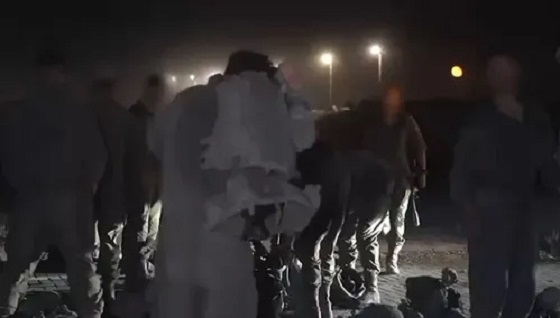
 International1 day ago
International1 day agoTrump-brokered Gaza peace agreement enters first phase
-

 Energy2 days ago
Energy2 days ago“It is intellectually dishonest not to acknowledge the … erosion of trust among global customers in Canada’s ability to deliver another oil pipeline.”
-
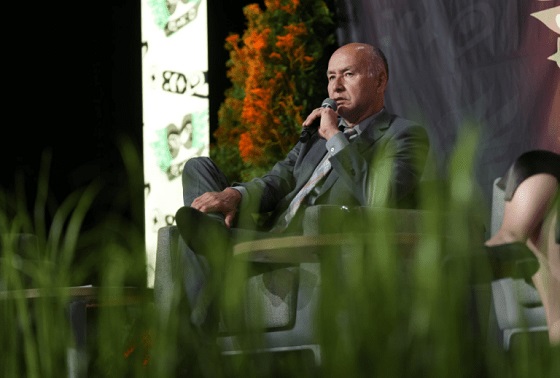
 Energy2 days ago
Energy2 days agoIn the halls of Parliament, Ellis Ross may be the most high-profile advocate of Indigenous-led development in Canada.
-
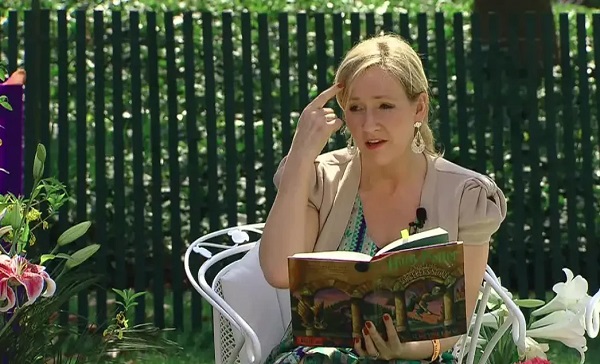
 Aristotle Foundation2 days ago
Aristotle Foundation2 days agoEfforts to halt Harry Potter event expose the absurdity of trans activism
-

 International2 days ago
International2 days agoIsraeli government approves Gaza ceasefire
-
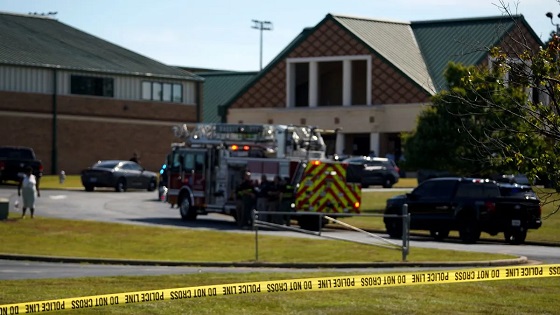
 Crime2 days ago
Crime2 days agoFlorida teens credited for averting school shooting plot in Washington state
-

 Alberta1 day ago
Alberta1 day agoAlberta Is Where Canadians Go When They Want To Build A Better Life

